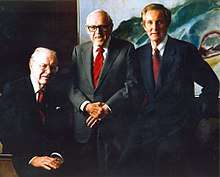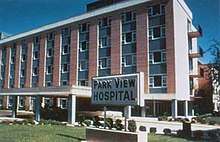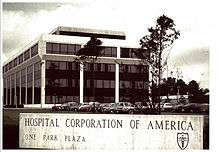HCA Healthcare
HCA Healthcare is an American for-profit operator of healthcare facilities that was founded in 1968. It is based in Nashville, Tennessee and, as of May 2020, owns and operates 186 hospitals and approximately 2,000 sites of care, including surgery centers, freestanding emergency rooms, urgent care centers and physician clinics in 21 states and the United Kingdom[4].
 | |
Formerly | HCA Holdings, Inc. |
|---|---|
| Public | |
| Traded as | |
| ISIN | US40412C1018 |
| Industry | Health care |
| Founded | 1968 Nashville, Tennessee, U.S. |
| Headquarters | Nashville, Tennessee , U.S. |
Number of locations | 186 Hospitals, approximately 2,000 sites of care located in 21 states and the United Kingdom[1] |
Area served | United States and United Kingdom |
Key people | Sam Hazen (CEO) John Reay (CEO, HCA UK)[2] |
| Revenue | |
Number of employees | 280,000 (2020)[1] |
| Website | hcahealthcare |
By conducting large-scale clinical research with partners including the Harvard Pilgrim Institute and the CDC, and using data gathered from their patients, HCA Healthcare has published several medical studies in peer-reviewed journals, including the REDUCE MRSA study[5] published in the New England Journal of Medicine.
The company has been the subject of numerous lawsuits and scandals involving, among other things, accounting fraud,[6] insider trading[7], lawsuits[8], and federal investigations[9], plus criminal punishment, fines, and penalties.[10] [11]
The company has also been involved in controversies involving illegal union busting[12] and unsafe conditions for workers[13][14] amidst the COVID-19 pandemic.[15][16]
History
Early years

HCA was founded in 1968, in Nashville, Tennessee by Dr. Thomas F. Frist Sr., Dr. Thomas F. Frist Jr. and Jack C. Massey.[17] The founders envisioned a company that would bring together hospitals to deliver patient-focused care while using the combined resources of the organization to strengthen hospitals and improve the practice of medicine. [18] The company began with Nashville's Park View Hospital, which the elder Frist had founded in 1960 with other doctors and where he was serving as chief executive.[18]
The company included 11 hospitals when it filed its initial public offering on the New York Stock Exchange (NYSE) in 1969[18] and had 26 hospitals and 3,000 beds by the end of the year.[17][18]

Growth and merger
The 1970s were characterized by rapid growth in the industry and for HCA Healthcare. In the early 1980s, the focus shifted to consolidation with HCA Healthcare acquiring General Care Corporation, General Health Services, Hospital Affiliates International and Health Care Corporation. By the end of 1981, the company operated 349 hospitals with more than 49,000 beds.[19] Operating revenues had grown to $2.4 billion.[17]
In 1987, HCA Healthcare, which had grown to operate 463 hospitals (255 owned and 208 managed), spun off HealthTrust, a privately owned, 104-hospital company. Believing its stock was undervalued, the company completed a $5.1 billion leveraged management buyout led by chairman Thomas F. Frist, Jr.[20] in 1988.[17] HCA Healthcare re-emerged as a public company in 1992. In February 1994, HCA Healthcare merged with Louisville, Kentucky-based Columbia Hospital Corporation, which earlier had acquired 73 hospitals of Galen Health Care from Humana,[21] to form Columbia/HCA.[22]

Recent history
On November 17, 2006, HCA Healthcare became a private company for the third time when it completed a merger in which the company was acquired by a private investor group including affiliates of Kohlberg Kravis Roberts and Bain Capital, together with Merrill Lynch and HCA Healthcare founder Dr. Thomas F. Frist, Jr. The total transaction was valued at approximately $33 billion, making it the largest leveraged buyout in history at the time, eclipsing the 1989 buyout of RJR Nabisco. It would later be surpassed by the buyouts of EQ Office and TXU.[23]
In May 2010, HCA announced that the corporation would once again go public with an expected $4.6-billion IPO. In March 2011, HCA sold 126.2 million shares for $30 each, raising about $3.79 billion, at that time, the largest private-equity backed IPO in U.S. history.[24]
In December 2018, a historical marker was installed in the parking lot of HCA's Sarah Cannon Cancer Center in Nashville, formerly the location of HCA's first hospital, Park View Hospital.[25]
The company was ranked No. 67 in the 2019 Fortune 500 list of the largest United States corporations by total revenue.[26]
Facilities
United States
As of 2020, HCA operated 186 hospitals and approximately 1,800 sites of care, including surgery centers, freestanding ERs, urgent care centers, and physician clinics located in 21 U.S. states and in the United Kingdom.[27] In July 2007, HCA sold its hospitals in Switzerland.[28]
As of 2018, HCA had 50 hospitals and 31 surgery centers in Florida.[29] In Texas, as of 2018 it had 53 hospitals.[30] In Tennessee, where it began, it had 13 hospitals as of 2019.[27]
Between 2003 and 2017, HCA did not enter any new markets; in 2017, it acquired the Memorial University Medical Center in Savannah, Georgia which added to its existing seven hospitals in the state. In 2019 it purchased Mission Health System which operates hospitals in North Carolina.[31]
In 2017, it acquired three Houston hospitals from Tenet Healthcare.[32]
In January 2020, HCA Healthcare acquired Valify, a healthcare cost-management company.[33][34]
In May 2020, HCA acquired 49-bed Shands Starke (Fla.) Regional Medical Center and 25-bed Shands Live Oak (Fla.) Regional Medical Center from CHS. HCA is operating the two facilities as off-campus emergency departments of Lake City (Fla.) Medical Center and North Florida Regional Medical Center in Gainesville. [35]
United Kingdom
The main hospital sites within the United Kingdom include:
- The Christie Private Care
- 52 Alderley Road, Manchester
- The Harley Street Clinic
- HCA at The Shard
- The Lister Hospital
- London Bridge Hospital
- The Portland Hospital for Women and Children
- The Princess Grace Hospital
- The Wellington Hospital
It opened urgent care walk-in centres at London Bridge Hospital and the Portland Hospital in March 2018. It claims that patients, on average, wait just seven minutes to see a nurse and 17 minutes to see a doctor.[36]
The Princess Grace Hospital specializes in breast cancer and surgery, aided by Professor Kefah Mokbel and Dr. Nick Perry who, in 2005, founded The London Breast Institute.
Fraud investigations
1993 lawsuits
In 1993, lawsuits were filed against HCA by former employees who drew attention to the company's questionable billing practices to Medicare for hundreds of millions of dollars.[11] Some of the allegations included charging the government costs for running its hospitals, paying kickbacks to physicians for referrals, and unlawfully charging for costs involving wound care facilities. A federal probe ensued, spanning nearly a decade, and culminated in 2003 with "the government receiving a total of over $2 billion in criminal fines and civil penalties for systematically defrauding federal health care programs."[37] The federal probe has been referred to as the longest and costliest investigation for health-care fraud in U.S. history.[38] With federal investigations still underway, HCA was acquired by Columbia Healthcare; their growth and expansion continued under the company's founder Rick Scott.
1997 fraud
In 1997, amid growing evidence that HCA "had kept two sets of books, one to show the government and one with actual expenses listed" [11] Scott resigned, and became a venture capitalist. Thomas Frist, a co-founder of HCA and brother of U.S. Senator Bill Frist, took Scott's place.[11]
In March 1997, investigators from the FBI, the Internal Revenue Service and the Department of Health and Human Services served search warrants at Columbia/HCA facilities in El Paso and on dozens of doctors with suspected ties to the company.[8] Following the raids, the Columbia/HCA board of directors forced Rick Scott to resign as chairman and CEO.[10] He was paid a settlement of $9.88 million and left with 10 million shares of stock worth over $350 million, mostly from his initial investment.[39][40] In 1999, Columbia/HCA changed its name back to HCA, Inc. HCA also admitted fraudulently billing Medicare and other health programs by inflating the seriousness of diagnoses and to giving doctors partnerships in company hospitals as a kickback for the doctors referring patients to HCA. It filed false cost reports, fraudulently billing Medicare for home health care workers, and paid kickbacks in the sale of home health agencies and to doctors to refer patients. In addition, it gave doctors "loans" that were never intended to be repaid as well as free rent, free office furniture, and free drugs from hospital pharmacies.[7][41]
2001 felonies
After Scott stepped down, Frist Jr. returned as chairman and CEO. He called on longtime friend and colleague Jack O. Bovender, Jr. to help him turn the company around. Frist and Bovender, who became CEO in 2001, pulled off what Fortune magazine called a remarkable corporate rescue.[38] In settlements reached in 2000 and 2002, Columbia/HCA pleaded guilty to 14 felonies and admitted systematically overcharging the government by claiming marketing costs as reimbursable, striking illegal deals with home care agencies, and filing false data about use of hospital space.
2002 federal investigation

In late 2002, HCA agreed to pay the U.S. government $631 million, plus interest, and pay $17.5 million to state Medicaid agencies, in addition to $250 million paid up to that point to resolve outstanding Medicare expense claims.[11] In all, civil lawsuits cost HCA more than $2 billion to settle.[9] The name subsequently reverted to "Hospital Corporation of America." HCA abandoned the use of its name in its home market and instead promotes its Nashville hospitals under the TriStar brand. The federal investigations, which spanned nearly a decade, drew to a close in 2003 with "the government receiving a total of over $2 billion in criminal fines and civil penalties for systematically defrauding federal health care programs."[9] The case has been referred to as the longest and costliest investigation for health-care fraud in U.S. history.[38]
2005 accounting fraud
In July 2005, U.S. Senator Bill Frist sold all of his HCA shares two weeks before disappointing earnings sent the stock on a 9-point plunge. Frist claimed that he sold his shares to avoid the appearance of a conflict of interest if he ran for president. Other executives sold their stock at the same time. Shareholders sued HCA and alleged that the company made false claims about its profits to drive up the price, which then fell when the company reported disappointing financial results. Eleven of HCA's senior officers were sued for accounting fraud and insider trading.[6] HCA settled the lawsuit in August 2007, agreeing to pay $20 million to the shareholders.[42]
Nurses' union controversy
In February 2019, HCA purchased the nonprofit Mission Hospital for $1.5 billion.[43] Since being absorbed into HCA, Mission has been plagued by widespread complaints over cuts in staff, poor communication, and lack of access to basic supplies and personal protective equipment for the COVID-19 pandemic.[12] The nurses filed for an election in March, with 70 percent of them deciding to join National Nurses United, a union that could protect them from HCA.[12] The company has been trying to illegaly threaten nurses to leave the union, via forced meetings with management in which the nurses were lied to and tried to be forced to leave the union.[12] The nurses were pulled away from treating patients by management and pulled into mandatory meetings about their unions, leaving patients untreated and rising nurse-to-patient ratios.[12] The firm’s founder Michael Penn was found to have violated federal labor law when he threatened employees would lose their benefits if they voted in a union, and again when he threatened to sue a pro-union employee at DHL for “defamation.”[12] Under federal law, the hospital's actions were illegal and unlawful.[44]
Coronavirus response controversy
In 2020, HCA was reported to be laying off nurses in the midst of the COVID-19 pandemic, despite receiving over $700 million in federal aid.[15] The company was also reported to not be providing required N95 masks to nurses to protect them from the disease, despite these being vital to the safety of patients.[14] The company denied these events were happening, despite reports from the labor union of nurses plus documentation of the issue.[14] The union also reported that nurses were dying because of the lack of protection being provided.[13] 83 percent of the nurses reported “being compelled” to reuse single-use disposable respirators or masks, and 70 percent said they had worked with “exposed skin” while caring for confirmed or suspected COVID-19 patients.[16]
See also
- Rick Scott, former chairman and CEO, former governor of Florida, and current U.S Senator
- Jack Bovender, former chairman and CEO (2002–2009)
References
- "HCA Healthcare Fact Sheet" (PDF). HCA Healthcare. June 2019. Retrieved 23 June 2020.
- "John Reay President and Chief Executive Officer". HCA Healthcare. Retrieved 23 June 2020.
- "HCA Healthcare Annual Report Pursuant to Section 13 or 15(D) of the Securities Exchange Act of 1934" (PDF). HCA Healthcare. 20 February 2020. Retrieved 23 June 2020.
- https://investor.hcahealthcare.com/corporate_profile
- https://www.cdc.gov/hai/epicenters/reduce_mrsa.html
- "In re HCA Inc., Securities Litigation". Retrieved Jul 26, 2013.
- "Disaster Of The Day: HCA". Forbes.com. December 15, 2000.
- "U.S. Expands Search of Columbia/HCA in Texas". The New York Times.
- "The Accomplishments of the U.S. Department of Justice : 2001-2009" (PDF). Justice.gov. Retrieved 2 October 2017.
- 2 Leaders Are Out at Health Giant as Inquiry Goes on. New York Times, July 1997
- Appleby, Julie (December 18, 2002). "HCA to settle more allegations for $631M". USA Today.
- Cunningham-Cook, Matthew; Michels, Jonathan (2020-05-06). "Giant Hospital Corporation Takes Advantage of Coronavirus to Fight Nurses' Union Drive". The Intercept. Retrieved 2020-06-04.
- "Nurses protest against layoffs and pay cuts they say HCA Healthcare has planned". wtsp.com. Retrieved 2020-06-04.
- Munoz, Carlos R. "HCA Healthcare nurses protest working conditions". Sarasota Herald-Tribune. Retrieved 2020-06-04.
- "HCA Healthcare Hospital Nurses Protest Possible Layoffs". www.baynews9.com. Retrieved 2020-06-04.
- "HCA Healthcare plans hospital layoffs, nurses say". Tampa Bay Times. Retrieved 2020-06-04.
- "Our History". HCA Healthcare. Retrieved 2018-06-22.
- Dr. Thomas Frist Sr., HCA Founder, Dies at 87, New York Times, January 8, 1998
- Brett Kellman (16 August 2018). "HCA: From single hospital to health care behemoth". The Tennessean. Retrieved 24 June 2020.
- Freudenheim, Milt. Buyout Set For Chain Of Hospitals. The New York Times, November 22, 1988.
- Steve Ivey and Ed Green (11 November 2011). "Humana's history has been one of recognizing opportunities". Louisville Business Journal. Retrieved 24 June 2020.
- "Factbox: Hospital operator HCA goes public again". Reuters. 9 March 2011. Retrieved 24 June 2020.
- Sorkin, Andrew Ross. "HCA Buyout Highlights Era of Going Private." New York Times, July 25, 2006.
- "HCA IPO prices at $30, sells more shares: sources". Reuters. 9 March 2011. Retrieved 2015-02-02.
- Stinnett, Joel (December 7, 2018). "Nashville marks the spot where HCA was born". Nashville Business Journal. Retrieved December 10, 2018.
- "Fortune 500 Companies 2019: Who Made the List". Fortune. Retrieved 2018-11-10.
- HCA Fact Sheet 2014. HCA currently owns the University of Central Florida College of Medicine and controls the board of directors for the medical school which it purchased in August of 2017. "HCA Facts" (PDF). Archived from the original (PDF) on September 5, 2015. Retrieved September 9, 2017.
- HCA sells Switzerland hospitals Nashville Business Journal, June 20, 2007.
- "Metro Orlando to get 3 new hospitals". www.bizjournals.com. Retrieved 2019-06-09.
- "HCA now owns 53 hospitals in Texas". www.beckershospitalreview.com. Retrieved 2019-06-09.
- "HCA's success over 50 years banks on sticking with the basics". Modern Healthcare. 2018-10-06. Retrieved 2019-06-09.
- "HCA Announces Agreement to Acquire Three Houston Hospitals from Tenet - HCA Investor Center". investor.hcahealthcare.com. Retrieved 20 December 2018.
- "HCA Healthcare Acquires Technology and Analytics Company Valify". Bloomberg.com. 2020-01-10. Retrieved 2020-03-19.
- "HCA Healthcare Acquires Technology and Analytics Company Valify". www.nasdaq.com. Retrieved 2020-03-19.
- "For-profit hospital M&A update: 12 deals involving CHS, HCA and Quorum". www.beckershospitalreview.com. Retrieved 2020-05-13.
- "HCA expands network of urgent care centres". LaingBuisson. 12 March 2018. Retrieved 11 May 2018.
- "Largest Health Care Fraud Case in U.S. History Settled". US Department of Justice. 26 June 2003. Retrieved 19 June 2020.
- david stires (9 February 2004). "Bringing HCA Back to Life After years of scandal, the hospital chain is healthy again--and might just be a buy". Fortune. Retrieved 19 June 2020.
- Korten, Tristram (2009-09-30). "Rick Scott profits off the uninsured". Salon.com. Retrieved 2013-08-15.
- "Hospital Firm Ousts Its Founder; Columbia/Hca Tries To Stop Slide. - Free Online Library". Thefreelibrary.com. 1997-07-26. Retrieved 2013-08-15.
- "The risk of choosing Scott". HeraldTribune.com. Retrieved 2013-08-15.
- "HCA finalizes Mission Health purchase". Modern Healthcare. 2019-02-01. Retrieved 2020-06-04.
- "Union Busting Tactics". leosu. Retrieved 2020-06-04.
Further reading
- Lutz, Sandy; Gee, E. Preston (1998). Columbia/HCA: Healthcare on Overdrive. McGraw-Hill. ISBN 0070248044.
- "2015 Annual Report to Shareholders" (PDF). Investor.healthcare.com. Retrieved 2 October 2017.
External links
- Official website

- The Wire: "Here's Why You Need to Know About HCA" (2012).
- Business data for HCA Healthcare: